 A Twitter thread by Steven Peck (@SciHoroscope )
A Twitter thread by Steven Peck (@SciHoroscope )
Thinking about Mormon fiction today. Because my back hurts and I can only write in short bursts. Twitter seems appropriate. (Note. I’m using “Mormon” here because there is nothing pithy that captures the broader movement.
Mormon literature includes non-Latter-day Saints, those in the borderlands of the Church, and it seems to me that to claim one is writing institutional literature of the Church of Jesus Christ of Latter-day Saints is a bold claim that few authors would dare own.
I always claim what I write does not necessarily represent the views of the institutional Church. So what am I writing? I write for a broader audience than members of the Church too yet my membership in the Church infuses all I write. This is not something we’ve solved.)
Now back to my point. Which is not about the word, ‘Mormon.’ I can’t seem to place myself. I lack a proper label even within the sensu lato category of Mormon literature. To the Librarians who have had to assign me place I apologize.
The philosopher Deleuze may have a suggestion. Clair Colebrook explains in her Routledge Critical Thinkers book, ‘Gilles Deleuze‘
Deleuze writes of what he calls ‘minor’ literature. He doesn’t mean what you think that means (People have built (and destroyed) careers figuring out what Deleuze means by the words he uses), e.g., Shakespeare and Joyce write minor literature.
Clair says of minor literature, “It does not repeat the surface forms of literature, it does not reproduce already established forms and rhythms. What is reappeared in minor literature is literary becoming.
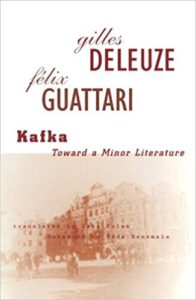 “To truly repeat a Shakespeare sonnet would demand reactivation all the forces of creation that produced the original, and this may mean abandoning sonnet forms altogether. Maximum repetition is maximum difference.
“To truly repeat a Shakespeare sonnet would demand reactivation all the forces of creation that produced the original, and this may mean abandoning sonnet forms altogether. Maximum repetition is maximum difference.
“Repeating the past does not mean parroting its effects, but repeating the force and difference of time, producing art today that is as disruptive of the present as the art of the past.
“A minor literature ‘repeats’, not in order to express what goes before, but to express an an untimely power, a power of language to disrupt identity and coherence.”
A minor literature then takes forms, styles, works, from the past and tries to capture, or repeat the transformative power. As the original did at the time, it will transgress norms, subvert power structures, that decide, for example, what counts as literature. It will raise questions. Good transformative questions not shallow challenge questions.
The donors to art institutions won’t be happy. The bookstores will turn up their nose, and guardians of genera will balk. Better to be safe rather than risk a loss of profit (economically and with clout). Safety first.
A minor literature, by contrast, does not repeat a voice or model but repeats the power of difference that produces the original… A minor literature repeat a voice, not in order to maintain the tradition, buy to transform the tradition…
All the literary and cinematic transformations of the Tempest make the Shakespearean original different, for the disclose the power of the original to become.”
Mormon literature too often wants to be a majoritarian literature in just the sense. It too often repeats what great literature has become to us, now, rather than to dare what the original dared. We mimic the style but not the radically of great literature.
So great Mormon literature in the mode of Deleuze would be to transform Mormonism. Not in the sense to try and remake it in our image, or make it conform to one’s liberal or conservative leanings, but to unleash its potential. To create new faithful niches for it to flourish.
To enhance its developmental opportunities in just the sense meant in any emergent phenomenon, aways judged by flowering forward in a developmental process that flowers into novelty.
Examples. Ok. Here are two.
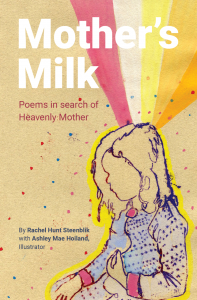
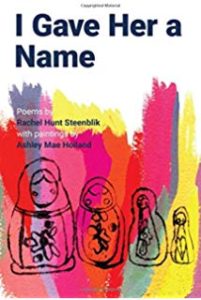 1) Rachel Steenblik’s
1) Rachel Steenblik’s @rachelsteenblik radical and faithful Mother in Heaven poetry on Mother in Heaven. She is creating a new niche. It works not because it mimics old poetic forms but because it creates one, like Walt Whitman did, a new form that lays the foundation for emergent theological and poetic work. Something unique and uncategorizable. Novel and important do transformative work.
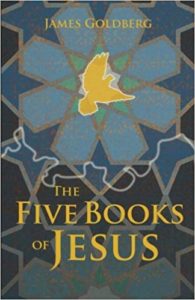 2) James Goldberg’s,
2) James Goldberg’s, @JamesGoldberg The Five Books of Jesus. What? You can’t add a gospel! You can’t write a new chapter in the life of Jesus!
But he doesn’t rewrite a gospel, or claim scripture, but does what good minor literature does by bringing Jesus to life. In it, is something again novel, meaningful, and wonderful emerges.
Neither of these faithful books are sold in Desert Book, which sells only majoritarian literature (and mark this–there is nothing wrong with majoritarian literature, my claim is just that is rarely transformative in the way we think the great literature out of days of yore did. As the way Deleuze articulates here).
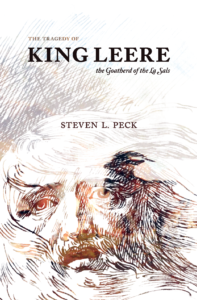 (BCC Press
(BCC Press @BccPress is producing minor literature. It is producing daring, transformative works. These are often not safe. But they are faithful. In these books, you can explore what Mormon literature can become and what we as a people can become. Read it. Some of the best writing in Latter-day Saint circles is coming out of it.)
Likely Deleuze’s ideas are as true in art as well. More on this another time. My back hurts. In a majoritarian way.
Check out Steve’s new novel from BCC Press, The Tragedy of King Leere, Goatherd of the La Sals. You can read Theric Jepson’s recent review of the book here.

